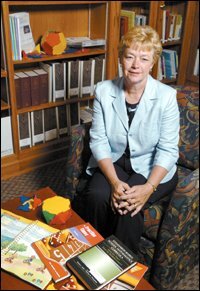
Since its founding more than a year ago, the Center for the Study of Mathematics Curriculum has launched a number of projects examining the expectations that states and schools set for students in that subject—and how they affect teacher training, textbook publishing, and other matters.
In its first published report, the center focuses on the factors that influence how states devise that curriculum, through a survey of state officials charged with the task.
Published this spring, “Development of State-Level Mathematics Curriculum Documents: Reports of a Survey” finds a strong desire among state curriculum specialists for national leadership in crafting math curricula. It also finds that those officials believe national direction would help increase the alignment of curricula from state to state and provide direction to textbook publishers.
States have influenced math curricula mostly through the drafting and revising of their academic standards to make them more specific, the authors found.
State officials “felt there was expertise they should have [been able to bring] to bear that they didn’t have,” said Barbara J. Reys, one of the authors of the report and a professor of mathematics education at the University of Missouri-Columbia, where the center is based. Understanding the “cohesion and coherence” of different state math curricula, or lack of those qualities, she said, is a major priority of the center.
Coalition Effort
The center’s work is overseen by a coalition of education researchers, school officials, and faculty members from Michigan State University, Western Michigan University, the University of Chicago, and other institutions. Nearly 30 other projects are under way, some of which are expected to be finished later this year.
The organization is financed through a five-year, $10 million grant from the National Science Foundation’s Centers for Learning and Teaching program. That $26 million initiative focuses on cultivating leaders in math, science, engineering, and technology education, strengthening professional development, and supporting overall research in those subjects.
The Center for the Study of Mathemetics Curriculm looks to help educators with timely studies and reports.
Iris R. Weiss, the president of Horizon Research Inc., a Chapel Hill, N.C., consulting company that is a partner in the center, said one of the curriculum-study group’s goals is “the development of a research framework that people can use to talk to each other.”
Many state math specialists are looking for that guidance, the center’s report says. Eighty-five percent of officials surveyed said national leadership would be helpful in crafting math curricula. Of those respondents, 68 percent said national advice would improve the alignment of math standards among states, and 53 percent said such guidance would improve direction to textbook publishers. Forty state officials responded to that portion of the survey.
While the survey did not specifically ask where the national leadership would come from, Ms. Reys speculated that some respondents were thinking about government entities, while others had professional organizations in mind. The report later mentions such organizations as the Reston, Va.-based National Council of Teachers of Mathematics, which published influential, voluntary math standards, and the Association of State Supervisors of Mathematics.
For most of this country’s history, the report notes, decisions about curricula rested with local school officials. In the 1980s and 1990s, state governments began to take a more active role, mostly through setting tougher, more specific state math standards, with new expectations for each grade level. State influence over curriculum also increased because of the No Child Left Behind Act, which requires states to set “challenging academic content standards,” the authors point out.
In Federal Law’s Shadow
Many observers have said that state and local responsibility over math standards and curricula results in publishers’ churning out textbooks that try to meet the needs of several states at once, rather than presenting the subject in a more coherent way.
Partly as a result, Ms. Weiss said, state math officials face a serious challenge in attempting to match curricula with textbooks and to provide teachers with a clear strategy on how to teach the subject at different grade levels.
The report says that 35 states have published new math-curriculum documents—mostly through the drafting of more specific state standards—since 2002, the year that President Bush signed the NCLB measure into law. Eighty-one percent of the respondents said they produced their most recent documents to provide better direction to teachers, but 55 percent indicated they did so in response to the No Child Left Behind Act or other federal mandates.
Scholars, parents, and others have criticized the National Science Foundation in recent years, contending that it has favored math research that emphasizes students’ conceptual mastery of the subject, rather than their development of basic math skills. Those detractors say the federal agency has given too much credence to the principles of the National Council of Teachers of Mathematics, which stresses the importance of developing student skills in math reasoning, in addition to basic skills.
David Klein, a professor of mathematics at California State University-Northridge, asked whether the new math-curriculum center would be advocating a particular point of view. While noting that he would wait to see what kind of research it produced, he said the NSF’s support for past projects made him skeptical of the new center’s objectivity. “It’s operated like a clique for the past 10 years,” he asserted.
John Bradley, the lead program officer for the NSF’s Centers for Learning and Teaching, acknowledged that several staff members associated with the new curriculum center have been involved with NSF-financed math projects in the past. But he pointed out that the center’s goal is to analyze existing materials.
“Our goal is to produce good research about math, no matter what your perspective is,” Ms. Reys added. “We have no particular perspective we’re pushing.”





